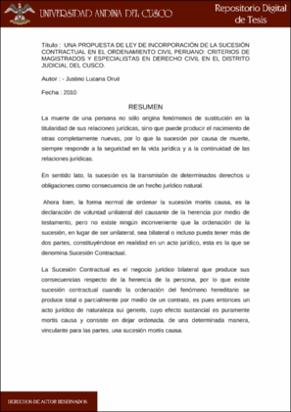| dc.contributor.advisor | Suárez Sánchez, Richard | |
| dc.contributor.author | Lucana Orué, Justino | |
| dc.date.accessioned | 2016-12-19T19:26:14Z | |
| dc.date.available | 2016-12-19T19:26:14Z | |
| dc.date.issued | 2010 | |
| dc.identifier.uri | https://hdl.handle.net/20.500.12557/521 | |
| dc.description.abstract | La muerte de una persona no sólo origina fenómenos de sustitución en la titularidad de sus relaciones jurídicas, sino que puede producir el nacimiento de otras completamente nuevas, por lo que la sucesión por causa de muerte, siempre responde a la seguridad en la vida jurídica y a la continuidad de las relaciones jurídicas.
En sentido lato, la sucesión es la transmisión de determinados derechos u obligaciones como consecuencia de un hecho jurídico natural.
Ahora bien, la forma normal de ordenar la sucesión mortis causa, es la declaración de voluntad unilateral del causante de la herencia por medio de testamento, pero no existe ningún inconveniente que la ordenación de la sucesión, en lugar de ser unilateral, sea bilateral o incluso pueda tener más de dos partes, constituyéndose en realidad en un acto jurídico, esta es la que se denomina Sucesión Contractual.
La Sucesión Contractual es el negocio jurídico bilateral que produce sus consecuencias respecto de la herencia de la persona, por lo que existe sucesión contractual cuando la ordenación del fenómeno hereditario se produce total o parcialmente por medio de un contrato, es pues entonces un acto jurídico de naturaleza sui generis, cuyo efecto sustancial es puramente mortis causa y consiste en dejar ordenada, de una determinada manera, vinculante para las partes, una sucesión mortis causa.
Esta clase de sucesión, por tradición jurídica fue siempre extraña al Derecho Romano, por lo que su prohibición subsiste en todas las legislaciones de raíz romanista, como es el caso del Derecho Peruano.
En efecto, la sucesión contractual en nuestra legislación civil se encuentra expresamente prohibida en el ordenamiento civil, ello mediante los Libros IV-Derecho de Sucesiones y el Libro VII-Fuente de las Obligaciones del Código Civil.
Por ello teniendo presente que la prohibición normativa actual supone una
indebida limitación al ejercicio de la libertad de contratar y de contratación, reconocidas constitucionalmente, es necesario replantear el estudio sobre la Sucesión Contractual en nuestro ordenamiento, como institución de Derecho Civil, a fin de establecer claramente sus principales características, proponiendo así su incorporación en el Ordenamiento Civil Peruano a partir de criterios jurídicos de Magistrados y Especialistas en Derecho Civil en el Distrito Judicial del Cusco buscando apartarse de las clásicas versiones doctrinarias que solo se ocupan de la Sucesión Contractual para justificar su prohibición. | es_PE |
| dc.description.abstract | The death of one person not just originates substitution phenomenon about the permanent of the legal relationships, rather which it can produce the nativity of other completely new, as a result the succession due to death , every time responds at the safety in the legal life and at the continuity of the legal relationships.
In a broad sense, the succession is the transmission of certain right or duties in consequence of a legal natural fact.
Now all right, the regular shape of order the succession mortis causa, is the unilateral will pronouncement caused by the person of the legacy by way of testament, but doesn't exist any inconvenient which the arrangement of the succession, instated of be unilateral, it may be bilateral or enclosed it can own more than two parts, constitute in fact in a legal act, this is designates Contractual Succession.
The Contractual Succession is the legal bilateral business which produces the consequences in respect of the person’s legacy, as a result exists a contractual succession when the arrangement of the hereditary phenomenon produces complete or partially by way of one contract, is on this account a legal act to sui generis nature, whose fundamental impact is purely mortis causa and consist in leave ordered, of a certain way, linked to the parts, one succession mortis causa.
This kind of succession, around legal tradition it was every time strange at the Roman Upright, as a result the prohibition persists in all the legislations of roman origin, as is the occurrence of the Peruvian Law.
In fact, the contractual succession in our civil legislation finds expressly forbidden in the civil ordering, it by means of the Books IV - Law of Successions and the Book VII – Fountain of the Duties of the Civil Code.
As a result, is necessary replant the survey about the Contractual Succession in our ordering , as institution of Civil Law, in order to establish clearly the leading characteristics, proposing in this way the incorporation in the Civil Peruvian Ordering from legal criterions of Magistrates and Specialists in Civil Law in the Judicial District of Cusco searching diverge of the classical doctrine versions which not other than itself they occupy only on the Contractual Succession in order to justify the prohibition. | en_US |
| dc.description.uri | Tesis | es_PE |
| dc.format | application/pdf | es_PE |
| dc.language.iso | spa | es_PE |
| dc.publisher | Universidad Andina del Cusco | es_PE |
| dc.rights | info:eu-repo/semantics/restrictedAccess | es_PE |
| dc.source | Universidad Andina del Cusco | es_PE |
| dc.source | Repositorio Institucional - UAC | es_PE |
| dc.subject | Propuesta de Ley | es_PE |
| dc.subject | Sucesiones | es_PE |
| dc.subject | Herencia | es_PE |
| dc.subject | Testamento | es_PE |
| dc.title | Una propuesta de ley de incorporación de la sucesión contractual en el ordenamiento civil peruano: criterios de magistrados y especialistas en derecho civil en el Distrito Judicial del Cusco. | es_PE |
| dc.type | info:eu-repo/semantics/masterThesis | es_PE |
| thesis.degree.name | Maestro en Derecho Civil y Comercial | es_PE |
| thesis.degree.grantor | Universidad Andina del Cusco. Escuela de Posgrado | es_PE |
| thesis.degree.level | Maestria | es_PE |
| thesis.degree.discipline | Derecho Civil y Comercial | es_PE |

